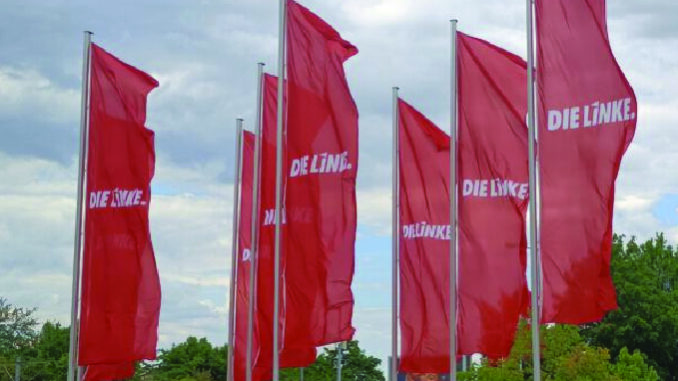
The author is also a DIE LINKE member.
How can the Party’s left react to the decline?
The crisis of the Left Party (Die Linke) has not come to an end even with the departure of Sahra Wagenknecht and her supporters. The hopes of many party members that things would now improve again have been dashed. There is little sight of the 3,000 new members in the last few months, and the Party’s position in elections and opinion polls are continuing to decline. Now the party leaders Janine Wissler and Martin Schirdewan have announced that they will not stand again at the federal party conference in October. Immediately after this announcement, Ines Schwerdtner and Jan van Aken declared their candidacies. What are the tasks of the Party’s left in this situation?
Ines Schwerdtner and Jan van Aken have expressed in interviews with Neues Deutschland (the daily newspaper associated with the Left Party) that they do not want to make any major changes in terms of content, but are convinced that they can unite the different political ideas in the party and get out of the crisis through different communication, a different form of politics or by concentrating on core issues (Schwerdtner).
But to solve a crisis, you have to first analyse it. The cause of the Left Party’s crisis is not discord or poor campaign management and communication. All of this is just an expression of the party’s political program and orientation and political contradictions.
Without changing course, no turnaround
In recent years, too many people have had this experience with the Left Party: in state governments and municipalities, it helps manage capitalist abuses and takes responsibility for cuts and deteriorations for the mass of the population instead of resisting them. Thuringia, when governed by Left Party Prime Minister Bodo Ramelow, has distinguished itself by not being fundamentally different from other federal states. Nobody needs a Left Party that does not implement left-wing policies. It is no wonder that the AfD can then seize on the justified discontent and channel it into racist and nationalist channels.
What is needed is a radical change of course towards a class struggle politics that are not oriented towards the supposed constraints of capitalism, but towards the needs of the working class and the socially disadvantaged. Such a policy would require a socialist perspective, i.e. the attitude of tackling today’s struggles and disputes as part of the struggle for fundamental change in society. This would primarily mean relying on mass mobilization and the self-organization of workers, not least by advocating a militant and anti-capitalist policy within the unions. Such a change of course would rule out government coalitions with pro-capitalist parties. Such a political change of course would then result in necessary changes in the structure, working methods and communication within the party, such as limiting allowances and full-time employees’ wages to an average skilled worker’s wage, expanding inner-party democracy and, above all, more campaign work in working-class districts and workplaces.
Tasks of the Party left
The problem is that there is little evidence that such a change of course can be implemented in the Left Party in the foreseeable future. The forces in the party’s apparatus and parliamentary and council factions that have made their peace with capitalism are too strong for that to happen. Nevertheless, the Left Party is the only party represented in parliament that declares itself to be socialist, expresses opposition to the prevailing politics and at least often supports movements and union struggles. In the current situation, it is therefore right for socialists not to leave the party, to call for its election and to campaign for the change of course outlined above. At the same time, they should not waste their limited time and energy on fruitless inner-party struggles, but concentrate their efforts on firstly formulating a clear political alternative, secondly implementing a clearly alternative policy where this is possible within party structures, and thirdly intervening in movements and class struggles to gather forces there that can play a role in the future if, for example, the question of a fundamental socialist change of course in the Party becomes possible or the formation of a new socialist workers’ party is posed becomes promising in the future. The building of a genuinely socialist force will undoubtedly happen, but only on the basis of major class struggles and the emergence of a layer of new activists in trade unions, movements and the left wing of the Left Party.
No lazy compromises
It is important that the Party left does not make any compromises until then, on the basis of not endangering the often-invoked “unity and cohesion” of the party, as the “Movement Left” (Bewegungslinke) tendency has done in recent years. This tendency bears a great deal of responsibility for the current state of the party, because it has weakened the opposition on the Party left to participation in government with pro-capitalist parties and has formed an unprincipled bloc with parts of the party right. The Anti-capitalist Left made the mistake of being blinded by the initial dynamic of the ‘Movement Left’ and supporting it largely uncritically instead of drawing a clear dividing line in terms of content, engaging in selective cooperation, but presenting itself as the socialist alternative within the party. If that had happened, the AKL could have a stronger position today. Lessons should be learned from this.
